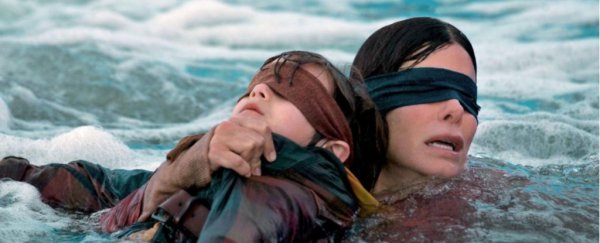Audiences were quick to praise Netflix's latest film Bird Box, an adaptation of Josh Malerman's 2014 novel by the same name, for its intriguing plot and suspenseful premise.
Due to the buzz surrounding it, as well as many viral memes, Bird Box broke the record for the streaming service's most-watched film in its first week of release with 45 million watchers.
Though Malerman hasn't commented on his intent in the original book, some people, after seeing the Netflix film, have taken issue with the story, claiming that it presents a negative depiction of mental health.
The criticism mostly spawns from the film's premise.
Warning: Spoilers below.
In the film, monsters exist that, when looked at, will drive a person to commit suicide. The only way to avoid this is to not look at the monsters, hence why Malorie, played by Sandra Bullock, dawns a blindfold throughout the film.
There seems to be one exception to the rule, however. Anyone with a mental illness who looks upon the creatures becomes actively evil and an agent in the monsters quest to destroy humanity.
Some critics thought the film "villainized" people with mental illness
In a post published by Mashable,writer Jess Joho critiqued Bird Box for villainizing people with mental illnesses.
She wrote, "Instead of killing themselves in gratuitously gory ways like all the 'normal' characters, people with mental illnesses become literal agents of evil, obsessed with carrying out the monsters' mission to destroy humanity."
Joho pointed to the former patients of a psychiatric hospital and grocery store clerk who is described in the film as "always a bit crazy" as evidence for this claim.
She continues by writing, "It's obvious that the creators of 'Bird Box' did not set out to create a film villainizing mental illness or sensationalizing suicide. If you squint at its woefully confused metaphors, there might be an allegory in the monsters as a darkness that perhaps only people who've lived with depression, psychological disorders, etc., would be familiar with. Yet a lack of awareness does not excuse the harm caused by 'Bird Box's' flagrant carelessness in handling extremely sensitive subject matter."
In agreement with Joho's argument that the film "villainizes" people with mental illness, Gavia Baker-Whitelaw wrote in the Daily Dot, "Tying into the suicidal violence of the main conceit, we learn that 'criminally insane' people are immune to the monster's powers, and want to expose other survivors and force them to kill themselves. What a sensitive depiction of mental illness!"
Others argued the film would have benefited from trigger warnings
Writing for Psychology Today, Shainna Ali Ph.D., LMHC argued that the use of trigger warnings could have benefited the film.
She noted that, although the film carries an R-rating for "adult themes, adult activity, hard language, intense or persistent violence, sexually-oriented nudity, drug abuse or other elements," that classification is too broad.
She wrote, "The current classification could benefit from specifiers pertaining to mental health trigger warnings for themes such as anxiety, trauma, self-harm, and suicidality."
She concluded, however, by saying that each person will see the film's depiction of mental health in their own way and it's important to remember "the difference in opinions are projections of our own perspectives."
Writing for The Mighty, Elizabeth Cassidy seemed to agree writing "If you're sensitive to suicide, especially graphic depictions of suicide, you may want to skip Netflix's latest thriller, 'Bird Box.'"
It isn't just critics discussing how mental illness is portrayed in Bird Box, however.
Many people on social media have blasted the film for its depiction of mental health
Twitter user @RamCity wrote, "One day we're gonna talk about how #BirdBox weaponised mental Illness and contributes to the phobia of people with mental illness…" while @leahhjana wrote, "I liked Birdbox but wow what a terrible way to portray mental illness."
One day we're gonna talk about how #BirdBox weponized mental Illness and contributes to the phobia of people with mental illness…
— The VirGoat… (@RamCity) December 24, 2018
One day we're gonna talk about how #BirdBox weponized mental Illness and contributes to the phobia of people with mental illness…
— The VirGoat… (@RamCity) December 24, 2018
w my new found twitter fame i would like to warn anyone struggling w mental health to watch bird box w a friend and not alone!! definitely provoked a TON of anxiety for me & there’s some pretty graphic stuff!
— 𝕒𝕝𝕚𝕤𝕒 (@alibeexo) December 27, 2018
On the flip side, however, some have praised the way Bird Box depicted mental health
Twitter user, @KaelBascon, wrote, "What makes a film great are the symbolisms and the reflection of one's society today. Birdbox [sic] absolutely crushed it with the issues of mental health awareness, a mother's love and sacrifice, adapting, connecting with other people and appreciating life's beauty through eyesight," while @madisonh121 wrote, "bird box [sic] leaving so many things unanswered was a metaphor for mental health in society. we often don't get the answers to why our loved ones harm themselves. the 'creatures' going unseen represents the demons in us that cause mental health issues, as we cannot see them either."
As seen from the reactions posted online, audiences are split on whether or not this film depicts mental health in a positive or negative light. Either way, it's important to note that this film does feature mass suicide which can be triggering to many.
This article was originally published by Business Insider.
More from Business Insider:
